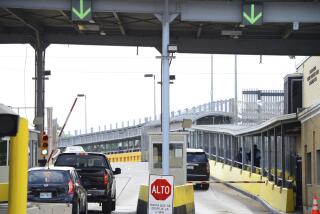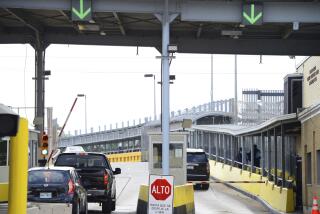Risk of meningitis infection from tainted injections decreases
- Share via
The U.S. Centers for Disease Control and Prevention said there were no new reports of fungal meningitis linked to tainted steroid injections responsible for dozens of deaths nationwide, closing the window of all known cases in a 42-day period ended Wednesday.
“People can rest a little easier but still remain vigilant,” CDC spokesman Curtis Allen told the Los Angeles Times. “What we’re finding is that the further out you go from the last injection, the less the risk.”
Wednesday was the end of the 42-day peak risk period since the CDC recalled the steroids Sept. 26 from the Massachusetts-based New England Compounding Center, which formulated the drugs for patients with back and joint pain.
More than a dozen meningitis cases related to the injections were reported last week, signifying that even past the initial six-week recall period, patients should watch for symptoms of infection, Allen said.
Fungal meningitis causes swelling of the membranes covering the brain or spinal cord; severity varies from person to person. Symptoms can include headache, fever, nausea, sensitivity to light, slurred speech and a stiff neck.
“This is new territory, essentially,” Allen said. “We know more than we knew yesterday; we’ll know more tomorrow than we knew today.”
The CDC says as many as 14,000 people may have received injections from the three tainted batches of the drug. About 97% of them have been contacted for follow-up.
As of Wednesday, there were 424 cases of fungal meningitis -- a non-contagious form of the illness -- linked to the tainted injections, with 31 cases fatal. An additional 10 patients who received injections in their joints were found to have “peripheral joint infections.”
Inspections of the compounding center by the U.S. Food and Drug Administration revealed several lapses in safety standards. Inspectors found greenish-black material floating in vials of medication, discolored equipment that was supposed to be sterile and leaking boilers.
The outbreak prompted another compounding center, Ameridose, run by some of the same people who operated the New England facility, to voluntarily recall its products as a precaution.
The Massachusetts pharmacy board’s director was fired Wednesday for ignoring a complaint in July that the New England Compounding Center was shipping drugs in bulk, in violation of its state license.
According to CDC statistics, Tennessee was hit the hardest with 13 deaths out of 79 cases, followed by Michigan with seven deaths out of 119 cases and Maryland with four deaths out of 51 cases. No infections linked to the drug were reported in California.
ALSO:
Nor’easter brings snow, winds to East Coast
Alabama’s ‘Ten Commandments judge’ retakes seat
Afghanistan massacre: Bales was denied promotion before incident
More to Read
Sign up for Essential California
The most important California stories and recommendations in your inbox every morning.
You may occasionally receive promotional content from the Los Angeles Times.











